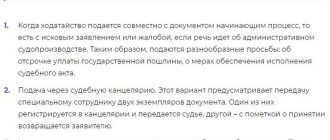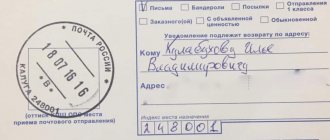A closed court session is permitted in cases where it is expressly provided for by the relevant procedural law. Publicity (openness) of judicial proceedings is one of the key principles of justice. Any deviation from it is an exceptional measure, which is taken by the court based on the impossibility of disclosing certain data to third parties.
Depending on the type of trial (criminal, civil, arbitration), the procedure for holding closed court hearings has its own characteristics. The differences are minor, but they need to be taken into account.
In what cases is a closed court hearing allowed?
When considering criminal cases, the format of the meeting is determined on the basis of Article 241 of the Criminal Procedure Code “Glasnost”. Holding a closed hearing is rare for a trial and requires a special procedure - a preliminary reasoned decision by the judge.
Note!
The grounds for holding a meeting behind closed doors in accordance with part 1 of paragraph 2 of the norm of the criminal procedure code No. 241 is the protection of information containing restricted information.
Such information includes information subject to restricted access based on Article 5 of the Law “On State Secrets,” as well as information limited in dissemination based on Presidential Decree No. 2103.
According to the law, state secrets include strategic and operational plans of the Armed Forces and data on the location of the army, achievements of science and technology that are of strategic importance for the defense of the state. Data on reserves of gold and platinum, as well as other valuables stored in the funds of the Central Bank, are considered secret. Information about intelligence operations and actions aimed at preventing terrorist attacks has limited access.
Cases involving trade secrets defined by Federal Law No. 98 and information protected by Article 12 of the Federal Law “On Investment Partnership” are considered behind closed doors. Also, information related to the civil rights of participants in the proceedings is not subject to public disclosure: the secrecy of wills and adoptions, protected by the Civil and Family Code.
In addition, criminal cases containing information related to professional activities are subject to a special review regime: tax, banking, auditing, lawyer, medical and notarial secrets cannot be publicly voiced even within the framework of criminal proceedings.
Closed hearings in civil proceedings
Cases requiring closed hearings in civil cases are specified in paragraph 2 of Article 10 of the Code of Civil Procedure of the Russian Federation. These include the following:
- the case contains a state secret;
- the case contains the secret of adoption.
Each of the participants in the process has the right to file a petition to consider the case behind closed doors if an open one would lead to the disclosure of commercial or other secrets or violate the right to privacy.
The composition of participants in a closed meeting is limited to the parties, their representatives, witnesses, experts and interpreters, as stated in paragraph 5 of Article 10 of the Code of Civil Procedure of the Russian Federation.
Paragraph 3 of the same article states that they are warned of liability for disclosing information obtained during the hearing.
Since the number of participants rarely reaches a dozen, if secret information is made public, it will be easy to find out who is to blame.
Paragraph 6 of this article prohibits recording the progress of the case using audio or other recordings. If the information gets out, it will make it difficult to prove its veracity. Because providing a recording means signing a violation of the law.
An example of a closed hearing is a paternity case. Especially if the child believes that he is being raised by his own father.
Divorce proceedings are also a potential closed hearing, since both the husband and wife have the right to request a closed hearing, citing a desire to maintain privacy.
Grounds for holding a closed court hearing
When considering a criminal case behind closed doors, the court ruling must indicate the specific facts on which such a decision was made. The grounds for holding a closed trial are enshrined in paragraphs 1-4 of Article 241 of the Criminal Procedure Code.
Note!
In addition to the presence of restricted information in the case materials, the court will decide to hold a closed hearing if the accused is a person under 16 years of age.
Also, behind closed doors, the court considers cases under Article 18 of Chapter 1 of the Criminal Code of Russia “Crimes against sexual integrity and sexual freedom of the individual.” The information contained in these cases may contain information about the intimate lives of the participants in the process. Public dissemination of this type of information can humiliate honor and dignity.
According to paragraph 4 of the norm of the criminal procedure code, the court will decide on a closed hearing to ensure the safety of the participants in the process and their loved ones.
Closed hearing of criminal cases
When the court session is closed, the judge, the accused and victims or their representatives, lawyers and prosecutors remain in the courtroom from outside observers.
Witnesses, experts, translators and other persons, without whom a full-fledged trial is impossible, enter the room for the duration of the interrogation and then leave the room. Neither of them knows what the other told the court.
Article 241 of the Code of Criminal Procedure of the Russian Federation, dedicated to the principle of publicity, states in the first paragraph that the proceedings are carried out openly. Exceptions are listed in paragraph 2 of the same article of the Code of Criminal Procedure of the Russian Federation.
State secret
If it is likely that during the hearing information that is state will be affected. secret, such a case is considered behind closed doors.
For example, there was a murder of a military department employee. And it turned out that the reason was his professional activity, in particular, the development of a defense program. Since information about the program is important for the security of the country and is still available to a small circle of people among the developers, the hearing will be closed so as not to make the secret public ahead of time.
Based on paragraph 2 of Article 241 of the Code of Criminal Procedure of the Russian Federation, cases that are fraught with the disclosure of not only state, but also commercial, banking or other secrets protected by law are considered behind closed doors.
The accused is under 16 years old
Despite the fact that paragraph 1 of Article 20 of the Criminal Code states that criminal liability begins at 16 years of age, you can become a defendant earlier.
According to paragraph 2 of the mentioned article, you will have to answer for a number of crimes at the age of 14. These include terrorism, murder, rape, making explosives, hostage taking, and so on.
If the person who committed the crime is between 14 and 16 years old, then the consideration of the case will take place without prying eyes.
This is due to the fact that from the point of view of the law, a minor, even one who has committed an unlawful act, is a child. And it needs additional protection and the creation of gentle conditions for proceedings related to age-related mental characteristics.
Possible humiliation of human dignity
If a case is being heard about crimes that infringe on sexual freedom and personal integrity, then intimate details will certainly emerge. To avoid humiliation of human dignity, no one other than the participants is allowed to attend such meetings.
A striking example is rape cases. If the victim is forced to tell in detail who did what to her, then it is better if only the participants in the process hear it, and not a full hall of people.
Security at risk
The last exception to the principle of transparency is the risk of endangering the participants in the process or someone from their environment.
If the court hearing is open, then a relative of the accused will freely enter the courtroom. And nothing will stop him from going out into the street, following the witness whose testimony convinced the court of the guilt of his loved one, and taking revenge. For example, stealing a child. Or beat up the witness himself. Or commit murder.
If there are grounds to believe that the accused will be avenged, for the protection of witnesses the case is considered behind closed doors.
Request for a closed trial
The transparency of the trial is guaranteed by Article 123 of the Russian Constitution. At the same time, guided by Article 23 of the country’s main law on privacy and personal life, you can submit a request to hold a meeting behind closed doors.
Also, the basis for filing a request for a closed hearing in criminal cases are the reasons specified in Article No. 241 of the Criminal Procedure Code: protection of participants in the process, the accused is a person under 16 years of age, the case materials contain secret information protected by law, the case under consideration is classified as a crime against sexual integrity.
Note!
According to the Criminal Procedure Code, a petition can be filed at any stage of the proceedings.
Article 119 of the Code of Criminal Procedure states that all participants in criminal proceedings can apply: victims, suspects, accused, lawyers, private and public prosecutors.
A request for a closed court hearing may be made orally, in which case it is recorded in the minutes of the meeting. You can also apply to the court in writing to request a hearing behind closed doors.
The court may make a decision on granting or denying the petition immediately, taking into account the opinions of the participants in the process, or within three days, if it is not possible to make a determination immediately.
If the request is refused, the participants in the criminal process have the opportunity, in accordance with Article 120 of the Criminal Procedure Code, to re-submit a request to hold the meeting behind closed doors.
Holding open meetings with restrictions
An open meeting presupposes the possibility of the presence of any persons, including representatives of the media. Journalists are usually attracted to high-profile trials. Ordinary citizens often go to court out of curiosity or professional interest.
In open meetings, those present have the opportunity to record the progress of the hearing, in particular, make audio and video recordings, make written notes, drawings, etc. Sometimes such actions interfere with legal proceedings. To limit the recording of meetings, the court has the right to establish a special ban. This does not make the process closed, but it cannot be called completely open either. Typically, courts refer to an obstacle to an objective examination of evidence, a threat to the safety of participants in the process, and a violation of their rights and legitimate interests. The use of technical means may create noise or other interference with the normal course of the process. This also sometimes appears in the grounds for establishing restrictions.
In order for the court to establish prohibitions or restrictions, a participant in the process may file a corresponding petition. But the final decision is up to the court. Quite often, judges do this so as not to create a stir due to the influx of visitors and journalists in high-profile cases. In this case, such persons are simply not allowed into the room where the hearing is taking place, citing the interference with the conduct of normal proceedings and the calm examination of evidence.
In general, closed meetings are considered a last resort. They are held infrequently. Mainly in criminal cases of sexual crimes, murders with particular cruelty, etc., as well as in almost all cases related to state secrets.
Is it possible to lift the ban on publicity of criminal proceedings?
The openness of trials for criminal offenses is provided for in Article 241 of the Code of Criminal Procedure. According to this rule of law, during open court hearings, participants and citizens present can record the process using audio recording devices. Video recording and broadcast of a court hearing is carried out only with the permission of the chairman of the court.
Resolution of the Plenum of the Supreme Court No. 35 of 2012 “On openness and transparency of legal proceedings” in paragraph 22 draws the attention of the judiciary to the fact that in cases of transfer of a case to higher courts, the order of the hearing is determined by the court, regardless of the format in which the process was previously held.
Commentary on Article 241 of the Code of Criminal Procedure of the Russian Federation
1. Publicity is not just one of the general conditions of judicial proceedings, but also a principle of legal proceedings. Publicity is expressed, in particular, in the openness of the court hearing, the concept of which is not disclosed in the Code of Criminal Procedure of the Russian Federation. In paragraph 1 of Art. Article 6 of the European Convention for the Protection of Human Rights and Fundamental Freedoms states that “everyone has the right, in the determination of his civil rights and obligations or in the determination of any criminal charge brought against him, to a fair and public hearing.” The concept of openness and publicity of legal proceedings is given a detailed description in the decision of the European Court of Human Rights of December 8, 1983 in the case of Pretto and others v. Italy: “The public nature of legal proceedings, referred to in paragraph 1 of Article 6, protects litigants from the secret administration of justice outside of control from the public; it serves as one of the means of ensuring confidence in the courts, both higher and lower. By making the administration of justice transparent, it contributes to the achievement of the objectives of Article 6(1), namely fairness of trial, the guarantee of which is one of the fundamental principles of any democratic society.” <1>. In another decision (Ekbatani v. Sweden, dated May 26, 1988), the European Court spoke even more clearly: “... as far as publicity is concerned, all case materials are available to the general public” <2>. There may be general publicity and publicity of the parties. General publicity is the opportunity for everyone to be present at the trial, as well as coverage of everything that happens at the trial in the media, primarily in the press. Publicity of the parties is the right of both parties to be present during procedural actions, to get acquainted with all the materials of the case and to make statements. Publicity can also be complete or limited. General publicity may be limited to a number of persons (for example, for persons under the age of 16); on the scope of procedural actions (if individual actions, steps or stages of the process do not allow the presence of unauthorized persons), as well as on the nature of the circumstances being clarified (representing state or personal secrets, offending morality or capable of causing a violation of public peace). The publicity of the parties is limited when one or another party is excluded from participation in procedural actions or is limited in the opportunity to familiarize itself with the case materials. Violations of the principle of transparency should be distinguished from restrictions on the principle of transparency. Thus, general publicity suffers if the trial is not held in a courtroom or other place specially announced to the general public, but in a room about which the public is not notified and where access is inconvenient or objectively difficult for it (for example, in the judge’s office ; in a building where there is a strict access security regime, etc.). Considering the importance of publicity for the adversarial process, it should be considered as its obligatory condition. Ensuring it is an indispensable duty of the court. Conducting trials in empty halls, in the presence of only the parties, deprives the adversarial process of dynamism, dulls the sense of responsibility for the case among the court, prosecutors and lawyers, and leads to a decrease in the quality of work to an unacceptably low level.
——————————— <1> European Court of Human Rights. Selected solutions. T. 1. P. 431. <2> Ibid. P. 584.
2. A closed trial is a consideration of a case by a court without the presence of the public and the press in the courtroom, but with the participation of the parties. In this case, the case is considered in a closed court session in compliance with all norms of criminal proceedings. If the subject of consideration in court is information constituting a state secret, the parties are not deprived of the right to participate in their investigation. Their removal from participation in the case due to lack of access to state secrets does not comply with the Constitution of the Russian Federation, its Art. 48 and part 3 of Art. 123. As the Constitutional Court of the Russian Federation indicated, “...the legislator, when determining the means and methods of protecting state secrets, must use only those that in a specific law enforcement situation exclude the possibility of disproportionate restriction of the rights and freedoms of man and citizen. Within the framework of criminal proceedings, such means may, in particular, be holding a closed court hearing, warning participants in the process about the non-disclosure of state secrets that have become known to them in connection with the criminal proceedings, and bringing these persons to criminal liability in the event of its disclosure" <1 >.
——————————— <1> Resolution of the Constitutional Court of the Russian Federation of March 27, 1996 N 8-P in the case of verifying the constitutionality of Articles 1 and 21 of the Law of the Russian Federation of July 21, 1993 “On State Secrets” in connection with complaints from citizens . V.M. Gurdzhiyants, V.N. Sintsova, V.N. Bugrova and A.K. Nikitina // Northwestern Russian Federation. 04/08/1996. N 1. Art. 1768.
3. On the concept of state and federally protected secrets, see com. to Art. 183.
4. On the basis of Part 5 of this article, photography, video recording, and filming in an open court session may be carried out by authorization, if this does not create obstacles to the trial. However, in relation to audio recordings, it is not a permit, but an appearance procedure, i.e. it does not require court permission. However, if the use of sound recording equipment violates the order of the court session, the presiding officer has the right to warn the person about the inadmissibility of such actions, or remove him from the courtroom, or, in cases provided for by law, impose a monetary penalty on him (Article 258).
Let's sum it up
Thus, a closed study of a case is permitted in cases where there is a risk of disclosure of important secrets or personal information, when minors are participants in the proceedings. When considering civil cases, the meeting may be closed at the request of a participant in the proceedings. The same applies to arbitration cases.
The petition is drawn up according to a certain template. It will need to state why the meeting needs to be closed and what will happen if the case is heard in open court.
Additional features and nuances
- If during the trial of a case it is necessary to study mail messages, telephone conversations, correspondence, then the disclosure of this information is permitted only if people agree to it. If not, such information is studied in a closed meeting. A closed meeting is also necessary if the materials (photos, videos, audio and others) are of a personal, intimate nature.
- People who are in open court can record what happens in the form of an audio recording or a written recording. If the chairperson agrees, then photographing, video recording, and broadcasting the meeting on television or the Internet is permissible. If there is an open hearing at the stage of pre-trial proceedings, then broadcasting it using the above methods is unacceptable.
- The verdict is announced in an open hearing. If the meeting is closed, then it is permissible to announce the introductory and final parts of the sentences passed.









